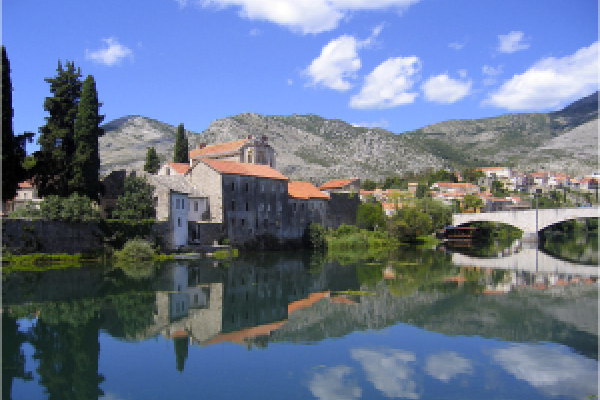
Learn Survival Bosnian
Wikitravel users have collectively created a free Bosnian phrasebook with the goal of making it possible for travelers to "get by" while traveling in areas where Bosnian is spoken.
Wikitravel phrasebooks are available in many languages and each one varies in depth and detail. Most of the phrasebooks include a pronunciation guide, a general phrase list, information about dates and numbers, a color list, transportation-related phrases, vocabulary for shopping and phrases for eating and drinking. Some are even more in depth, and all are free!
From Website
After secession from Yugoslavia, the Bosnian government declared the official language to be called "Bosnian" rather than "Serbo-Croatian." However, "Croatian," "Serbian," and "Bosnian" are considered by linguists and travellers alike to be one and the same language, with minor idiomatic differences. Bosnian (Serbo-Croatian) is a Southern Slavonic tongue in the Slavonic group of languages of the Indo-European family. It is closely related to Slovenian, Macedonian, & Bulgarian. Nouns have gender and cases, and the past tense is conjugated by gender and person while other tenses are conjugated only by person.
The language itself should not prove difficult to pronounce. Grammatical complexities will however present challenges to those not familiar with highly inflected languages, such as Latin or Russian. Inflection is the grammatical process of altering the noun to indicate its position & function in the sentence. The noun is said to have "case." Whereas English nouns are defined in the sentence through the use of prepositions - as in the sentence "Mary throws the ball to John," inflected languages alter the form of the noun, so "John" in the example would appear as the indirect object in the sentence in the dative case (indicated by the change in the suffix, and less frequently the prefix) and "ball" as the direct object in the accusative case. The same sentence in Bosnian/S-C would have no preposition "to" as in "Mary baca loptu Johnu." Notice that "John" received a "u" as a suffix, which immediately governs the meaning of the word "Johnu" and dictates its function in the sentence. In another similarity with Latin as well as the other Balto-Slavic languages (except Bulgarian-Macedonian), Serbo-Croatian does not use articles; there ARE a few ariticles, but they are rarely used even in literature and formal speech.
Certain idiomatic differences exist in Serbian and Croatian, mostly as a result of regional applications. Some phrases, such as alahimanet and merhaba, are relatively unique in Bosnian usage, as they are a remnant of Islamic (and therefore Turkish)/Ottoman influences. Consulting separate pages on the Croatian & Serbian phrasebooks may prove beneficial to those interested in better understanding such regional differences.
Bosnian (Bosanski [bɔ̌sanskiː], Cyrillic: босански) is a name commonly used for Serbo-Croatian as spoken by Bosniaks; as a standardized form of the Shtokavian dialect, it is one of three Serbo-Croatian standards used officially in Bosnia and Herzegovina. The same subdialect of Shtokavian is also the basis of standard Croatian, Serbian, and Montenegrin, so all are mutually intelligible. Up until the dissolution of former SFR Yugoslavia, they were treated as a unitary Serbo-Croatian language, and that term is still used to refer to the common base (vocabulary, grammar and syntax) of what are today officially four national standards. The Bosnian standard uses the Latin alphabet, though the Cyrillic alphabet is also accepted, chiefly to accommodate previous usage in the former SFR Yugoslavia, but is seldom used in practice.
The name of the language is a subject of some controversy in Bosnia and Herzegovina, Croatia, and Serbia and is sometimes alternatively referred to as Bosniak (also spelled "Bosniac"; bošnjački), reflecting a position that it is the standard language of Bosniaks, not all Bosnians (i.e. Croats, Serbs and Bosniaks).
Gaj's Latin alphabet or Gajica is a variant of the Latin alphabet, based on Jan Hus's Czech alphabet, adopted by the Croatian linguist Ljudevit Gaj. A modified version of it, containing a contribution by Đuro Daničić, is currently used for the standard languages of the former Yugoslavia: Croatian, Serbian, Bosnian, and Montenegrin (Serbo-Croatian). A corresponding Cyrillic script, the vukovica (Serbian Cyrillic), is used for Serbian and Montenegrin. A slightly reduced version is used as the script of the Slovene language. It is also the basis for the Banat dialect of the Bulgarian language.